|
“The Festival wants to take its own road.” This remarkable statement was made by Nai-chu Ding, Executive Director of
China’s Wuzhen International Theatre Festival (WITF), which just convened for the third time, from October 15 to 24, 2015. And indeed, although the Festival’s press
materials say that WITF aspires to being the Avignon or Edinburgh of the East, in fact its mission is specific to the complex Chinese world, and thus, unlike any festival
anywhere.
Hand in hand with increasing censorship, there is an explosion of artistic enterprise in China today: now a publisher has been kidnapped;
now a sparkling, high-design new museum has opened. Now a cultural organizer is arrested; now an impressive new urban arts district is under way. Now a journalist is on trial;
now a new theatre, innovative by any standards, is about to open. One day you’re reading about the torture of innocents; the next, the news is full of China’s
artists catapulting to international acclaim, their architects designing imagination-expanding structures, their writers on all discriminating readers’ Best-of lists. In
countries around the world—including my own—violence and injustice share the same geographical territory with inexplicable eruptions of courageous, physical-plane
defying creative acts by individual artists and artistic communities. China is not immune to these dizzying contrasts.
China has a young generation with money to spend, and it spends a lot of it on culture. Western concert halls, operas and theatres mostly
attract upscale older patrons, who can more typically pay the high ticket prices. But it verges on a truism to say that in China, it is the young who are filling the seats, and
the young whose disposable incomes are fuelling the country’s drive for cultural participation in the world.
Not everyone supports the trajectory this cultural growth is taking. Some Chinese artists thought the spectacular Opening Ceremony for the
2008 Beijing Olympics, for example, was techno nonsense, and a sadly missed opportunity to show the world a China of real creative substance. Others note the vulgarity of the nouveaux riches,
known for their ostentatious consumption of luxury items. A recent case in point: Liu Yiqian, the billionaire art collector who just bought the Modigliani nude at
Christie’s for one of his private museums, for $170.4 million. Liu said his collecting is “an opportunity for Chinese art lovers to see good artworks without having
to leave the country”—a notion I’ve heard expressed by others, as well: China deserves its own. But professionals in the Chinese art world balk at Liu’s
background: he sold handbags on the street and drove a cab before making a killing in pharmaceuticals and real estate. Such people, it is said, “have very little
discrimination, they just buy the most expensive things.”
Chinese critics of China’s Millennials say they have grown up without any sense of history. In the collected interviews, Ai WeiWei
Speaks, and elsewhere, Ai Wei Wei has pointed out that the two generations before the Millennials had virtually no books on either modern art or literature. Last month, I
heard China scholar Magnus Fiskesjö (based at Cornell University) give a lecture called “Heritage and Ancestors: The Politics of Chinese Museums and Historical
Memory.” His talk suggested that museums are filling the void of general historical knowledge with artificial narratives of an imaginary, glorious past. On the subject of
China’s museum boom, Fiskesjö writes: “…museums serve as a tool for shaping a hegemonic notion of Chinese identity… especially through the selective
remembrance of Chinese history.”
It’s already hard enough to evaluate all this if you’re following from inside China. It may depend on your news sources whether
China is simply “going in the wrong direction,” as my colleague put it—becoming more conservative, censored, and violent in significant ways—or whether
this is outweighed by a historic, irreversible surge of inventive enterprise. And for an interested westerner, observing from abroad, it only gets harder to determine in which
direction China’s extremes balance.
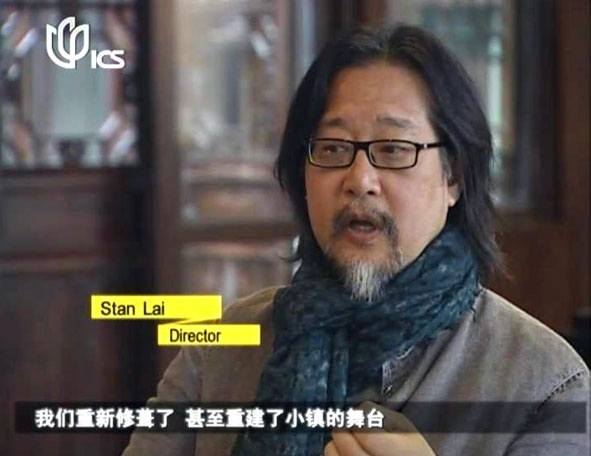
Playwright-Director Stan Lai. Festival co-founder, Artistic Director for WITF 2013, 2014;
current Executive Chairman.
In 2007, I had a correspondence with Stan Lai (Lai Shengchuan), the Taiwanese legend-in-his-own-time playwright-director. We
had traded places for the year: I’d been teaching his classes at the Taipei National University of the Arts while he was teaching near
my home in California, at Stanford University. About my year–my fifth living in Asia–he wrote: "I hope that your experiences have
led you to better understand the complicated thing it means to be Chinese."
“To better understand the complicated thing it means to be Chinese.” Those words have stayed with me all these years since,
and come back to me many times over the last three years I’ve spent deeply involved specifically with mainland China. Lai’s
words have also come back to me in China at the Wuzhen International Theatre Festival, for which Lai is one of the
founders, was Artistic Director for the Festival’s first two years, and is currently Executive Chairman.
In fact, the two remarks taken together seem to express perfectly why the Wuzhen Festival is so extraordinary: first, the remark I
quoted at the opening by (Lai’s wife) Nai-chu Ding—“The Festival wants to take its own road”—and then, Lai’s hope for a westerner
“to better understand the complicated thing it means to be Chinese.” Originality. Communication.
*
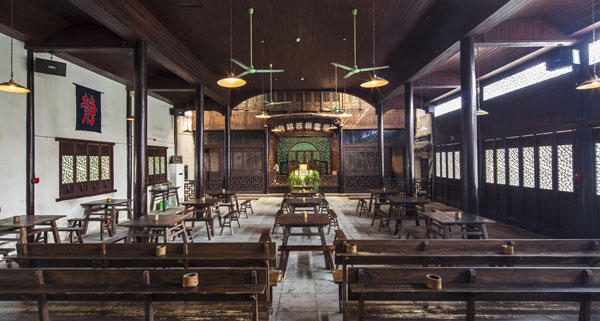
The Traditional Storytelling Hall. During the Festival, the venue for the Wuzhen Dialogues
series. Photo www.wuzhenfestival.com
The Wuzhen International Theatre Festival is made up of a
number of different interlocking components: the main theatre offerings, the competition for young playwrights, the workshop
series, and the ongoing outdoor shows. (See links below for my Scene4 articles on the Festival overall and on these components).
An additional part of the Festival, and what I find most striking, is the Dialogues series, which brings together theatre artists from
the invited productions with Festival-makers in interesting combinations for informal conversations in front of audiences,
around a theme that’s been announced ahead of time. (See link below for my piece for TCG on these.)
This is a courageous and complex undertaking. Here is a very old
public hall (the Traditional Storytelling Hall) lovingly refurbished: a long, narrow room, with shining wood and stone floors,
featuring the town’s characteristic, delicately carved window coverings. Attendees arrive expectantly from the rear, and take
their places on the benches near the back, or at the tables that begin midway into the room. There are fresh pots of chrysanthemum tea on each table.
There is a hum in the room that starts to break up and then settle
when the guest speakers enter from the side door and mount the raised platform to find out which of the polished armchairs
they’ve been assigned behind the enormous bank of fragrant flowers. Press photographers scurry in to get a few shots and exit
noiselessly; someone from the Festival sets up an inconspicuous video camera and vanishes. Aside from these, the gathering is an
essentially “analog” experience. There is whispering, and then rustling, and then—
—Then what? Here is an audience of mostly Chinese speakers,
along with a score of people from multiple countries abroad. With a few exceptions, the Chinese speakers don’t share a language
with those Dialogue-ists from abroad, who in turn don’t share a native language between them. This year’s Festival program was
made up of 10 Chinese-language shows—from mainland China, Hong Kong and Taiwan—and 10 international shows, from Brazil,
France, Germany, Italy, Lithuania, Netherlands, Poland, Russia, and Switzerland. There were 8 Dialogues sessions between about
25 people, plus moderators who knit the proceedings together with questions and comments, including during the final question-and-answer period.
Now the room is packed with all these exceptional theatre lovers,
who all have stimulating thoughts they are determined to share. Someone—and sometimes someones—has to tell all the different parties what is being said.
Occasions like these that I’ve attended at the theatre festivals
around Europe have been more formal. Sometimes the speakers were quite far from the spectators, too. Even when the artists
themselves declined to speak in slick media-ese, there was still a large press presence, which set a certain mood. There were
professional translators—also called oral, or simultaneous, interpreters—either visible in soundproof booths or placed
behind and above us. In any case, they were separated from the audience. They were typically working between the host country’s
language and one or two other Western languages.
Imagine it: in Wuzhen, there might be one or more of the
speakers (including moderators) on the platform doing double-duty to translate between Chinese and English speakers during
the discussion, or there might be a translator onstage with everyone, or a translator just offstage, with a pot of tea, doing
simultaneous translation being received through headphones. But of course there are many different native “Englishes,” and the
international speakers may have impenetrable grammar, or impossible accents. They may try to use, in English,
expressions—or worse, jokes—from their own languages that make no sense. A translator into English or Chinese might not be
quite up to translating theatre terminology or heightened discourse on aesthetics. An unskilled translator can turn the most
interesting remarks into very dull or superficial ones. And presumably vice versa.
Sometimes a lesser-spoken language, such as Korean, is shakily
translated into Chinese, and from there into English—a kind of linguistic game of Telephone with the results we might expect.
Once a Cantonese speaker insisted on trying to speak a Mandarin the Mandarin-speaking translator couldn’t follow. Sometimes one
translator corrects another; sometimes one or more audience members chime in with a vocabulary word or term. Once a young
Italian energetically translated his intermediate English into heavily Italian-inflected Chinese.
I find all of this extremely endearing. Like any improvisation, it
doesn’t always fly. On an off day, I don’t understand much and the benches seem hard. I’m sure the format will keep developing.
I want to understand more in the future. But to some extent, the hardscrabble nature of the gatherings is inherent to their charm.
And when it works, there’s simply no more exciting room for a Theatre Person to be in. Where else can I have so many masters
of world theatre translated—especially from non-European languages—while they think out loud, not much farther from me
than my teacup? For their commitment to opening an authentic, sophisticated conversation about theatre between such diverse
people, the Wuzhen Dialogues win the prizes for originality and fostering communication.
*
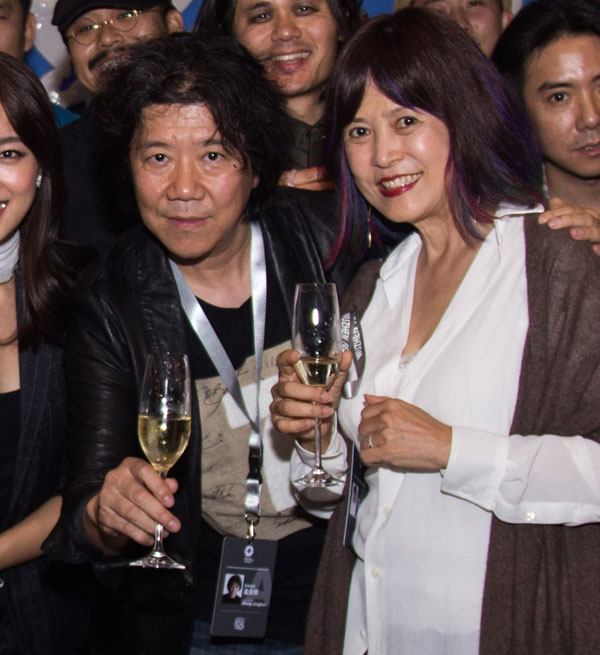
(L) Playwright-Director Meng Jinghui. The Festival’s co-founder, and Artistic Director for
2015, 2016; (R) Nai-chu Ding, producer and the Festival’s Executive Director.
Press photo.
The art of theatre proves that boundaries can be crossed, that
understanding and compassion can be cultivated, and exciting communication between people can be created. The theatre is the
source of our existence and it is our hope for a fruitful future.
—Meng Jinghui
the Festival’s co-founder and current Artistic Director
from his Welcome Message in the events catalogue
When I was invited to join a Dialogue session (my second of three
for the Festival) on the topic of “The Challenges Facing Theatre Festivals Today,” I thought I would talk about translation. Truly,
for festivals all over the world, the matter of translation for the productions on the program is a very large Elephant in the Room.
Too often, the surtitles are poorly translated, or hard to see, or missing. The “festival culture” encourages companies to try to
bypass the problem by developing “visual” pieces—relying on pantomime, puppets, gags, objects, tumbling, digital effects, and
so on. These only go so far. And until the international theatre sector has an army of specialized, nuance-sensitive translators
flocking to work at high-paying festivals, strategies for mitigating the problem need to be found.
But when the time for our session came, as with all good
conversations, our “Challenges Today” Dialogue went in wonderful directions I couldn’t have imagined—and none of them
needed my thoughts on translation. We talked for two hours—somewhat longer than scheduled—and then a group of young people invited us out for coffee to keep going.
In a perfect world, every year, every word of every Wuzhen
Dialogue would be edited and published in at least Chinese and English. Instead, here is a mere glimpse of the remarks made by each of the three speakers on that one day.
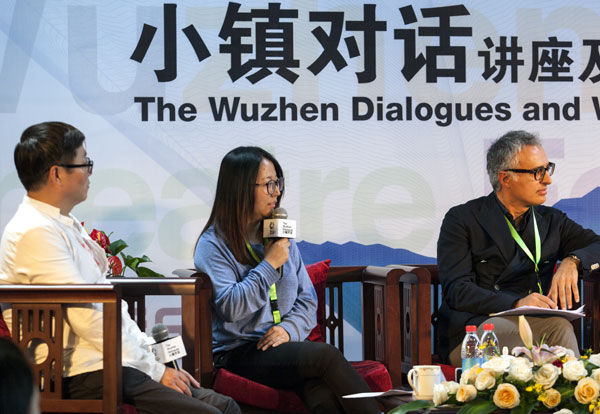
The “Festivals’ Challenges” Dialogues session. L to R: moderator, critic Raymond Zhou;
volunteer translator who supported Zhou and Ding, both fluent in Chinese and English. Filippo Fonsatti, General Manager, Teatro Stabile di Torino; President Italian National
Theatres Association. [Not pictured: Nai-chu Ding and myself.] Press photo.
Our moderator was the inimitable Raymond Zhou, who is widely
known from his many publications and hundreds of appearances every year as a theatre, film and cultural critic. As an interviewer,
Raymond has a knack for asking un-fussy questions that elicit richer-than-usual responses. This time he asked, for example:
Why do we have festivals? How do you measure a festival’s “success”? How do you compare Wuzhen to other festivals? How
should the shows be selected?—and more.
Note that all the remarks here revolved around themes of originality and communication.
Nai-chu Ding: theatre and film producer extraordinaire, and the Festival’s Executive Director.
In addition to making her “its own road” remark quoted above,
Nai-chu talked about some of the early impulses that nudged the Festival into being. Initially, working with the other founders to
evaluate the viability of the Festival, she and Stan Lai kept in mind “that there were already so many theatre festivals in the
world, and so many in China, too.” When Stan first came back from seeing Wuzhen, he said it was beautiful, but that “it lacked
soul”—by which he meant: it lacked a cultural life. I’ve heard Stan say similar things for almost forty years, so it qualifies as a “core
belief”: the health of a country can be measured by its theatre; the theatre is a nation’s “circulation.” It struck Nai-chu and Stan that
Wuzhen could be a place where “the world can see China and China can see the world.” That is, Wuzhen can serve as
“a window, so that both sides can see each other.”
Nai-chu also stressed that the Festival is only in its third year,
that it has no single set course, that it might still become something not yet imagined. In fact, this is almost guaranteed,
since the three artistic founders are each set to be Artistic Director of the Festival for two years, and their sensibilities are
complementary but completely different. The Festival strives “to balance the shows that have mass and limited appeal, to select
productions for both theatre veterans and newcomers.”
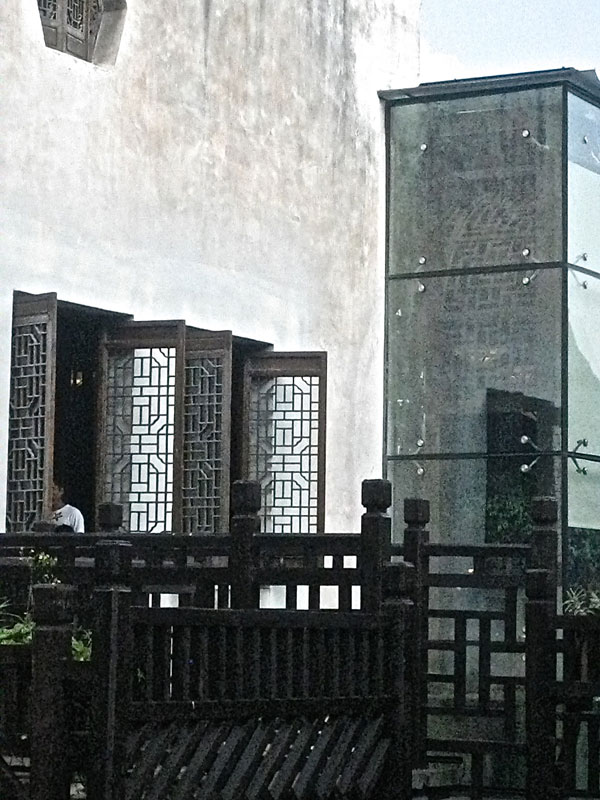
Wuzhen: An elegant architectural blend of old and new—a blend the theatre programming
also achieves. Photo L.T. Renaud.
Filippo Fonsatti: General Manager of Teatro Stabile di Torino—National Theatre, and President of Platea, the
Italian National Theatres Association, Italy
“In an era of globalization, I believe the traditional formula of
performing arts festivals has an important role to play only if it is able to propose beauty as a moral value, if it is able to put
together the social rite of empathic gathering with a quality aesthetic experience.”
“Cultural conformism is one of the greatest risks to the
performing arts festival in the era of globalization. Just like the Prada or Armani shops you can find in Milan, Paris, New York,
Tokyo and Shanghai with the same layout, the same windows and products… or like a Big Mac that tastes the same in Nairobi,
Beijing, Toronto or Sydney, likewise, if you travel the world, festivals offer the same names and titles. We have to avoid the
standardization of our cultural proposals… Unquestionably, anybody coming to the Wuzhen Festival will be able to enjoy
performances they cannot attend elsewhere, an opportunity to discover original creativity in a unique context.”
“I would say that a festival’s competitiveness is above all in its
ability to have a distinct identity compared to other festivals, the strength and skill to set up a unique environment making it
worthwhile to cross half the world to attend it because that is the only place where those performances can be seen.”
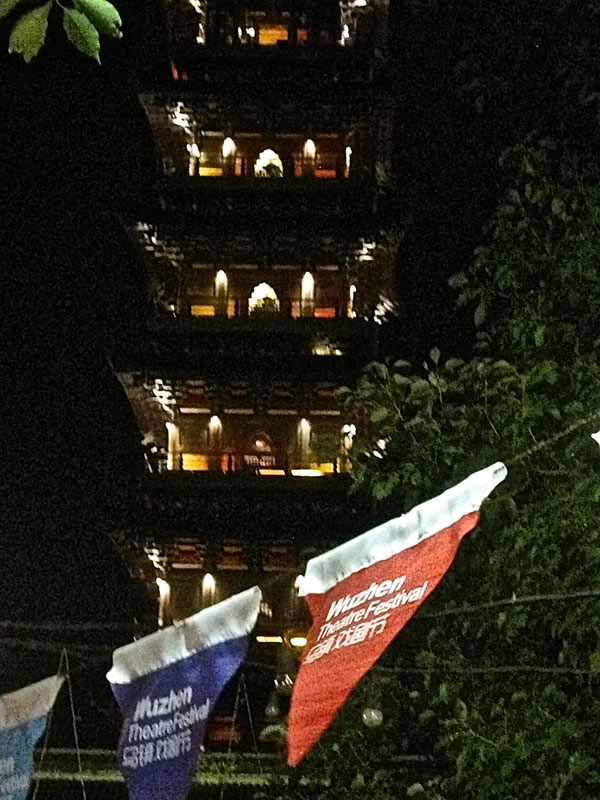
Wuzhen’s Pagoda with Theatre Festival flags. A windy night. Photo L.T. Renaud
Lissa Tyler Renaud: Member, International Association of Theatre Critics, founding editor Critical Stages
journal of theatre criticism, writer on international culture
“There’s often a gap between what the theatre companies want to
show, and what some audiences want to see. Festival organizers are working hard to bring in both cutting-edge productions and
new audiences, but these don’t always go together. Auteur directors, experimental and avant-garde companies want to be a
part of the newest trends in the theatre world—object theatre, postdramatic theatre, movement theatre, environmental and
documentary, live art and multimedia. But a large contingent of the paying audience comes expecting to see conventional plays,
and doesn’t know how to appreciate these alternative shows. It’s critical to protect the festivals’ freedom and ability to be
adventurous in their play selection, and easy to give audiences handles for understanding what they’re seeing: through
information in the program or directors’ notes, on the website, or in public talks and discussions that support the festivals’
offerings. Informed audiences can enjoy even the most wildly original and unconventional productions by the most committedly non-commercial theatre artists.”
“Theatre will succeed where politics fail. Where politics divide us,
the theatre brings us together. With the economic power of the world shifting from Europe to Asia, China is poised to have
profound impact on all our lives. Wuzhen is already forging meaningful friendships between China and other countries through the depth and range of its theatre festival.”
*
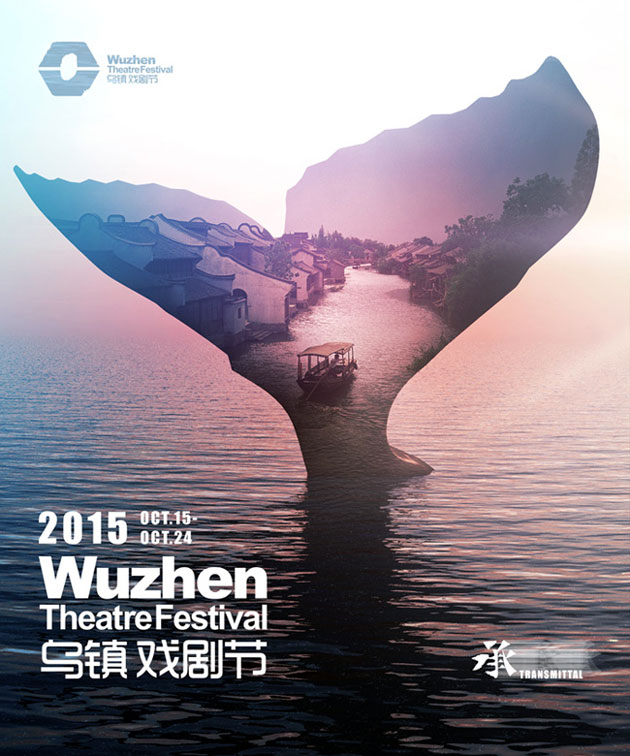
The “tail of the whale” logo for the 2015 Festival, with “Transmittal” theme.
This year’s Festival logo was the gigantic tail of a whale hovering
grandly over a narrow canal of the small town of Wuzhen. Meng said this improbable juxtaposition came to him as the perfect
expression of theatricality in life, and of the tidal wave the Festival will surely make in China’s theatre. I can vouch that it’s
an apt image for the hugely dramatic and visionary proceedings carried out in this diminutive, historic town.
Outsized versions of the image were posted everywhere during
the festival, and included the evocative word for this year’s theme: Transmittal. This referred to the passing on of the history
and art of the theatre from its masters to its young artists. But every time I saw it, I also thought of the mysterious songs the
whales use to communicate. Even though we can’t see them, these magical Transmittals are taking place under the surface,
over impossibly long distances, at fantastically high speeds.
The marvelous splash of the tail we see at the Wuzhen Theatre
Festival is matched only by the power of the song that follows under the surface. In dark times, under dark waters, from small
canals to vast oceans, currents are sending out the Festival’s improbable song of creativity, understanding, beauty, compassion, and hope.
* * *
FURTHER READING
About China’s Museum Boom
Magnus Fiskesjö, Heritage and Ancestors: The Politics of Chinese Museums and Historical Memory.
http://ieas.berkeley.edu/ccs/videos/2015.11.06_video.html
About the Wuzhen Theatre Festival overall
Lissa Tyler Renaud, Geniuses Making Live Theatre: China’s Wuzhen Theatre Festival, for Scene4.
http://www.scene4.com/archivesqv6/2015/jan
-2015/0115/lissatylerrenaud0115.html
Introduction to the Festival components
Lissa Tyler Renaud, Dreamy Theatre: Metamorphoses in Wuzhen, China, for Scene4.
http://www.scene4.com/archivesqv6/2015/mar
-2015/0315/lissatylerrenaud0315.html
About the Wuzhen Dialogues series
Lissa Tyler Renaud, Changing Audiences: Notes from China’s Wuzhen Theatre Festival, in the Audience (R)Evolution online
series by Caridad Svich for Theatre Communications Group (TCG).
http://www.tcgcircle.org/2015/03/changing-audiences-notes
-from-chinas-wuzhen-theatre-festival/
Cover Photo: Wuzhen’s main throughway,
lined from end to end, on both sides,
with banners of the world’s theatre masters;
names in Chinese and English.
Photo L.T. Renaud
|